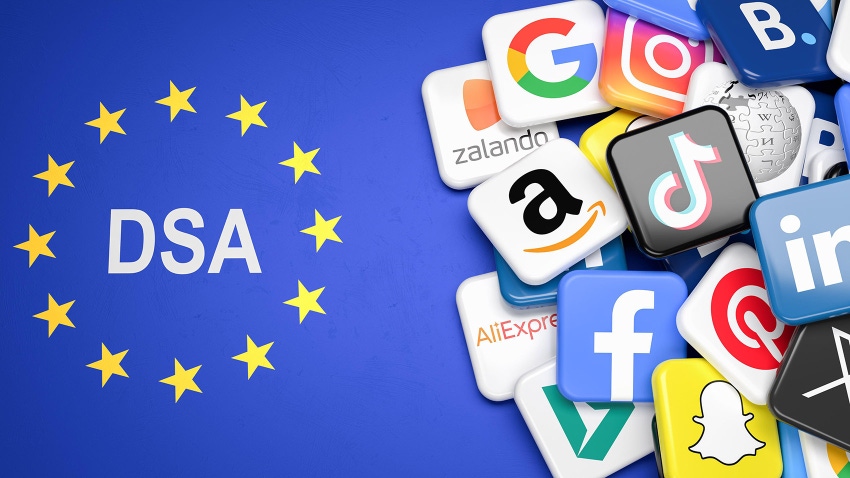EU Presses Mostly US Tech Firms for DSA Compliance
Seventeen tech firms, including Apple, Amazon, Google, Meta, Microsoft, YouTube, and others were contacted to provide information under a European law passed last year.

At a Glance
- The EU wants to ensure technology firms are complying with new standards for online platforms and search engines.
- US lawmakers say the rules unfairly target American companies and workers.
- Fines could sap a large chunk of US tech firms’ global revenue.
The European Commission on Thursday said that it has sent information requests under the Digital Services Act (DSA) to 17 tech firms, mostly in the US, to make sure they are complying with new competition rules passed last year.
The DSA designated the firms as Very Large Online Platforms (VLOPs) and Very Large Online Search Engines (VLOSEs) in April 2023. The EU said it contacted AliExpress, Amazon’s Amazon Store, Apple’s AppStore, Booking.com, Meta’s Facebook and Instagram, Alphabet’s Google products, Microsoft’s LinkedIn, Bing, Pinterest, Snapchat, TikTok, YouTube and Zalando. The Commission said it asked for more information on measures the firms took to comply with the new rules that went into force in November of last year.
The firms must provide the requested information by Feb. 8, the Commission said.
“Access to data by researchers is key to ensure accountability and public scrutiny of platforms’ policies,” the Commission said in a release. “Researcher access to publicly available data greatly contributes to the goals of the DSA, which is particularly important in view of upcoming event such as elections at national and EU level, as well as for an ongoing monitoring of the presence of illegal content and goods on online platforms.”
The DSA makes new rules for tech companies intended to prevent harmful content from spreading, banning, or limiting certain user targeting practices, and sharing some internal data with regulators and researchers. The rules are aimed at a total of 19 online platforms, which combine for more than 45 million EU users. The rules will expand later this year to include a variety of online platforms, regardless of size.
Lawmakers Call US Focus ‘Unfair’
In December, the Commission launched formal infringement proceedings under DSA against X, formerly Twitter, on several grounds, including suspected breaches of obligations concerning data access to researchers.
Last year, members of the US Senate Committee on Finance sent a letter to the Biden administration saying the EU’s regulatory focus on American companies was “discriminatory.”
Senate Finance Committee members Ron Wyden, D-Ore., and Mike Crapo, R-Idaho, wrote in the letter, “…regulatory efforts that discriminate against US employers and their workers by exempting the EU’s domestic companies, and even other foreign companies, are both unfair and counterproductive to the purported goals of ensuring privacy, protecting consumers, and promoting national security.”
The senators added, “The DSA and DMA [Digital Markets Act] form the cornerstone of the EU’s digital regulatory agenda. These laws are intended to promote laudable goals such as competition and consumer protection online. If the EU is serious about achieving these goals, however, it is wrong to enact legislation where the costs and responsibilities are borne principally by American companies…”
Bipartisan US House members sent another letter to the administration in December, also showing concern about the EU’s focus on American tech firms.
Firms Could Face Serious Fines
The DSA gives the EU authority to levy fines of up to 6% of an organization’s global revenue. And repeat offenses could result in a ban on the firms doing business in the EU.
After the Commission announced its X probe, the company said in a blog post, “We see a worrying trend whereby the EU or a member state will enact legislation with onerous and highly local requirements, or prescribe sever sanctions. The fairness of enforcement is dependent on due process protections embedded in the legal system around the law. Another country may then copy the law, often outside of the EU, but its legal and political system places less emphasis on due process.”
IT leaders should pay close attention to the EU’s regulatory moves, according to Martha Heller, CEO at executive search firm Heller Search. She tells InformationWeek the rules could impact how CIOs and CISOs approach compliance issues in the future. “As both producers and enterprise consumers of technology, CIOs and CTOs should pay close attention to the EU as it leverages its watchdog position.”
Read more about:
RegulationAbout the Author(s)
You May Also Like







